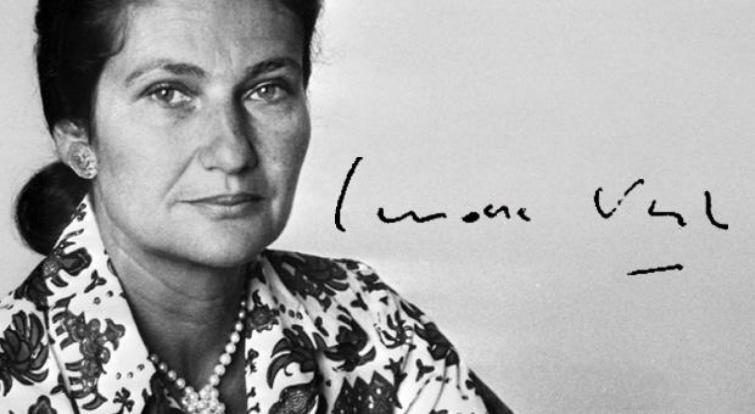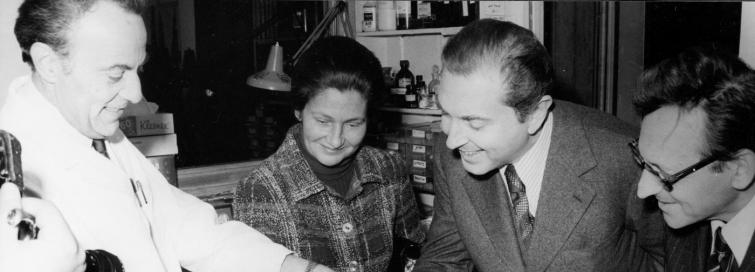
July 07, 2017
Bulletin interne de l'Institut Pasteur


Thank you, Simone Veil!
The Institut Pasteur owes much of what (and where) it is today to Simone Veil.
On June 12, 1975, Simone Veil, then French Minister of Health and Family, held a meeting with Jacques Monod, President of the Institut Pasteur, and Jean Royer, Chairman of the Board of Directors, to inform them that the government would be increasing its grant to the Institut Pasteur from 20 to 50.5 million francs. This government grant – a huge amount of money at the time – was urgently needed to help the Institut Pasteur overcome the major financial crisis it had been grappling with for several years.
The government's decision came at a time when the Institut Pasteur's financial situation had been in a constant downward spiral since the 1960s. Its assets had been reduced following several years of deficit, the Application Center set up in 1967 to promote the production and sale of products from Institut Pasteur research was undergoing a thorough overhaul, the Vaudreuil plant was struggling to get off the ground, the Institut Pasteur's management tools were ineffective and its relations with the government were at a low ebb. In 1971, in a bid to defend an institution that he saw as vitally important, Jacques Monod accepted the position of Institut Pasteur President – although this meant giving up his laboratory work, postponing the writing of his second book L'Homme et le temps and resigning from the Collège de France. Despite his efforts and commitment, Monod's "restructuring" plan did not immediately produce results, and the situation continued to decline. In 1974, he was forced to acknowledge that the drastic management measures that had been taken – including laboratory closures and a voluntary early retirement scheme – would not be enough. He held a General Meeting with all Institut Pasteur staff on October 21, 1974, during which he announced his plan to sell the land in Paris and relocate all staff to the Garches site:
"... The Institut Pasteur is bankrupt, and selling our Paris site will provide us with enough funds to build new premises in the suburbs. This transaction, which will be handled by the Deposits and Consignments Fund, will release substantial profits that we can use to strengthen industrial business, pay off our debts and guarantee our future. Of course, none of this will be possible without major sacrifices..."
Jacques Monod even considered moving the remains of Louis Pasteur and Emile Roux to Marnes-la-Coquette, where Pasteur died.
Given these dire circumstances, nearly a century after the Institut Pasteur was set up in rue Dutot, it was Simone Veil – recently appointed Minister of Health and Family on May 28, 1974, in Jacques Chirac's government during Valéry Giscard d'Estaing's term as President – who proved to be the Institut Pasteur's knight in shining armor. Shortly after taking office, she was informed of the difficulties by Jacques Monod and commissioned a report from an Advisor to the French Government's Accounting Office, Roland Morin, who was Deputy General Delegate for Scientific and Technical Research. It was on the basis of this report that the government decided to increase its grant, which over the next few years would represent nearly 50% of the Institut Pasteur's annual budget. To make sure it was administered effectively, she set up the post of Administrative and Financial Director, appointing another Advisor to the Government's Accounting Office, Jacques Bonnet, to this position (he was replaced a few years later by Jean Castex).
One condition attached to this increased state support was that the Institut Pasteur should withdraw from its industrial activities in the fields of diagnostics, serums and vaccines, which had resulted in the creation of the company Institut Pasteur Production (in which the Institut Pasteur, which had become the "Institut Pasteur Fondation", was initially virtually the only shareholder).
Simone Veil, as representative of the government, saved the Institut Pasteur by giving it the resources it needed to overcome this major crisis, while maintaining its unique status and a degree of autonomy, in line with Louis Pasteur's decision when he set up the Institut Pasteur in 1887. She understood that its unique position in the French public research environment was vital for its success, and ultimately for the scientific visibility of the sector as a whole.

Photo: Michel d'Ornano, French Minister of Industry and Research, and Simone Veil, Minister of Health, decide to increase the government's support for the Institut Pasteur, here with François Gros and François Jacob.
© Institut Pasteur
Over the following years, Simone Veil, Jacques Monod and François Jacob worked closely together, and Simone Veil's support for the Institut Pasteur never wavered. The three had an immense amount of mutual admiration for one another, as demonstrated by Simone Veil's tribute following Jacques Monod's death on May 31, 1976. She also set up the Pasteur-Weizmann committee and was subsequently involved in its work on a regular basis. In 1994, she chaired the ceremony held in Phnom Penh to lay the first stone of the Institut Pasteur in Cambodia, and in 1995 she gave a moving speech at the opening ceremony for the Year of Pasteur, marking the centenary of Louis Pasteur's death.
The increased government grant meant that in 1976, for the first time in 14 years, the Institut Pasteur's budget balance was restored, and Jacques Monod's restructuring plan could begin to produce results. The historical Paris campus was saved, and over the following years the Institut Pasteur became more stable, grew in visibility and was able to look to the future with confidence.
Thank you, Simone Veil!